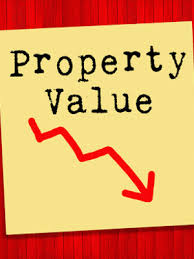
Contract signings to purchase previously-owned U.S. homes unexpectedly fell by the most since January, reaching the lowest level since mid-2014 amid mounting evidence that the housing market is struggling. New homes sales also tumbled 8.9% in October.
On the flip side the National Association of Realtors predicts prices to increase next year in almost every major market. How will prices increase while demand softens? Is the market telling us something vastly different? This is clearly not a blip with declining home sales!
What happened in the last home sales report
Pending home sales which is a predictor of future closings took a nose dive in the recent report released last week. The median estimates of economists in Bloomberg’s survey was calling for an increase in pending home sales. The index showed a drop of 2.6%. This is the lowest level in 4 years.
Why is this important?
If pending home sales drop, this means less people are buying homes. This shows a weakness in demand for purchasing existing homes. New homes are also reflecting a weakness as they have fallen 8.9% so this doesn’t appear to be an anomaly.
Why the drops?
There are three major drivers of the recent drops in home sales
- Rates: rates have increased substantially since the bottom of the market, as rates have risen, more purchasers are priced out of the market. Furthermore, many sellers are now reluctant to sell as their purchase would be at a higher rate. For example, I locked in at a very low rate mortgage less than 3%, if I went and bought a new house my new rate would be 5.25%, why would I trade into a higher rate?
- Price: Prices have increased dramatically throughout most of the country. Wages have not increased with prices leaving housing less affordable to buyers. High prices combined with rising rates has pushed many out of the “trade up” and first-time homebuyer markets.
- Economic Uncertainty: All the motion in the stock market and headlines about trade worries and a possible recession is likely taking a toll on consumer and business confidence. The lack of long-term confidence will hold back consumers from making large purchases like a home.
In 2019 rates will continue to rise and economic uncertainty will continue as volatility increases. This will lead to a continued slowdown in demand on the housing front. With a slowdown in demand, how can prices continue to rise?
The National Association of Realtors predicts price increases in 2019:
How is it possible that prices increase while demand is clearly showing a slowdown with the recent existing and new home sales indexes coming in substantially lower than expected? Before getting into the details of the report it is important to note that most realtors are optimistic. A realtor gets paid when a sale happens. Without sales, there is no paycheck. There is an incentive to be optimistic! This optimism is carrying over into their market predictions for 2019. There is no way economically that prices will increase while demand is falling. Furthermore, the National Association of Realtors predicts that “National inventory increases will remain low at less than 7%”. Basic economics tells us that as demand decreases and supply stays constant prices will at best stagnate and likely decline.
Here is the economic theory explaining the rationale:
The price adjustment mechanism: If the quantity supplied, Qs, is greater than the quantity demanded, Qd, at a price P0, then a surplus exists at P0. Because of this surplus, consumers will bid down the market price. As the market price decreases, the quantity demanded will increase and the quantity supplied will decrease until the quantity demanded equals the quantity supplied, at which point the surplus is eliminated and a market equilibrium is established.
Although there will be some markets that buck the trend due to demand or supply changes, most markets will be down slightly to flat next year with the wildcards being consumer confidence and pace of rate increases. The markets are telling a radically different story than the Realtor association, I would rely on the recent housing numbers as a guide to what 2019 has in store.
Resources/Additional Reading:
- https://www.wsj.com/articles/new-home-sales-fell-8-9-in-october-1543417455
- https://www.realtor.com/research/2019-national-housing-forecast/
- https://www.bloomberg.com/news/articles/2018-11-29/pending-home-sales-in-u-s-declined-to-four-year-low-in-october
- http://www.whitenova.com/thinkEconomics/supply.html
I need your help!
Don’t worry, I’m not asking you to wire money to your long-lost cousin that is going to give you a million dollars if you just send them your bank account! I do need your help though, please like and share our articles it would be greatly appreciated.
Written by Glen Weinberg, COO/ VP Fairview Commercial Lending. Glen has been published as an expert in hard money lending, real estate valuation, financing, and various other real estate topics in the Colorado Real Estate Journal, the CO Biz Magazine, The Denver Post, The Scotsman mortgage broker guide, Mortgage Professional America and various other national publications.
Fairview is a hard money lender specializing in private money loans / non-bank real estate loans in Georgia, Colorado, Illinois, and Florida. They are recognized in the industry as the leader in hard money lending with no upfront fees or any other games. Learn more about Hard Money Lending through our free Hard Money Guide. To get started on a loan all they need is their simple one page application (no upfront fees or other games).
